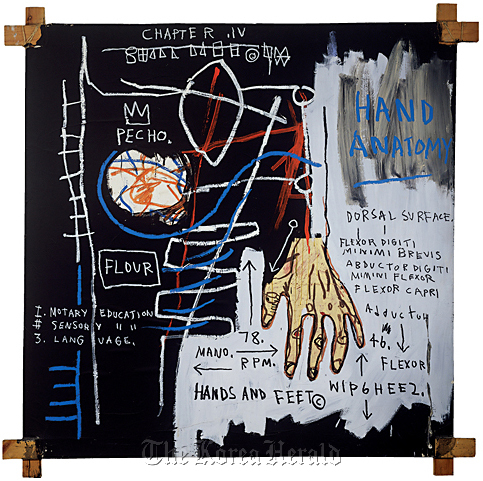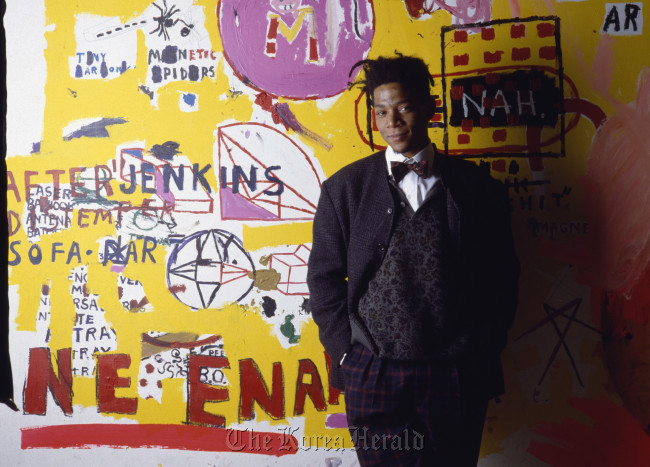 |
“Untitled (Hand Anatomy),” 1982 by Jean-Michel Basquiat. (2013 The Estate of Jean-Michel Basquiat/ADAGP, Paris/ARS, New York) |
African-American artist Jean-Michel Basquiat’s artistic career lasted only eight years before he died at age 27, but he still remains as a mainstay in the global auction market: A drawing by Jean-Michel Basquiat was sold at the top price of $15.2 million at an auction last Friday in London.
And now, some of his iconic works are on view at Kukje Gallery in Seoul until March, offering a broad survey of his works that left a lasting impression in the contemporary art scene in the 1980s.
As Basquiat said about his artistic process, “I don’t think about art when I’m working. I try to think about life,” his paintings reflect his personal life and the world he lived in.
 |
Jean-Michel Basquiat. (Julio Donoso/Sygma/TOPIC) |
Starting as a graffiti writer on the streets of Brooklyn and Manhattan under the name of “SAMO” (Same Old S―-), Basquiat rose to fame when he emerged in the New York art scene in the 1980s. Despite his lack of formal arts training, he was praised in the American and European art circles for his unique works.
The artist not only contributed to bringing street art to mainstream, but also incorporated his artistic talent to T-shirt designing, jewelry making, and music performance.
His paintings feature multiple personal and social messages presented through symbolic texts, list of words and imagery.
Some of them comment on racial issues and refer to prominent black figures in American society such as jazz musician Charlie Parker and baseball player Hank Aaron.
Basquiat’s 1981 painting mixes his personal stories and his idol by using cars and airplanes with symbolic words to depict his sickness during childhood and a hammer that symbolizes the legendary baseballer Aaron, who in 1974 broke the home run record formerly set by Babe Ruth.
Anatomy is also a significant part of his art, reflecting his personal trauma of having to undergo a splenectomy after being hit by a car at age 7.
He developed an interest in anatomy into visual language after his mother gave him a copy of the medical text “Gray’s Anatomy” when he was in hospital.
Before he died of a heroine overdose at age 27 in 1988, he led a short yet prolific career, producing works that left a lasting impression in the contemporary art scene which later garnered him a reputation as a Neo-Expressionism icon.
When he was 21, Basquiat was the youngest of 176 artists to be invited to the Kassel Documenta in 1982. His works were shown at the international art event alongside those of such established artists as Gerhard Richter, Cy Twombly and Andy Warhol. He also collaborated with his idol Andy Warhol, whom he befriended in 1983 and whose death later made a great impact on him.
The exhibition runs through March 31 at Kukje Gallery in Jongno, Seoul.
For more information, call (02) 735-8449.
By Lee Woo-young (
wylee@heraldcorp.com)









